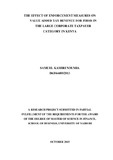| dc.description.abstract | A stable Revenue collection helps promote and strengthen a country’s revenue
collection targets. This helps countries meet their expenditure within a certain
financial period. The Kenya Revenue Authority is tasked with this very important
duty. Considering its basic function which is to collect and administer tax system in
the country, it has to ensure that it has put in place the right measures to attain this
goal .The purpose of this study was to establish the effect of enforcement measures
on Value Added Tax revenue for firms in the large corporate taxpayer category in
Kenya. The total population consisted of all 1052 large firms operating in Kenya as
categorized by KRA. Since the population of the study was large, sampling was
necessary .The sample size consisted of 106 firms in the Large Taxpayers’ Office.
The study used secondary data which was readily available from the Kenya Revenue
Authority and the Kenya National Bureau of Statistics. The study adopted a
descriptive survey of the firms in the large taxpayer category. It has been thought
strong tax enforcement measures on the VAT revenue for firms can contribute
significantly to the attainment of the goal of revenue collection Secondary data was
collected from KRA annual reports on VAT revenue from 2008 to 2014. Regression
analysis was conducted in order to establish the effect of enforcement measures on
Value Added Tax revenue for firms in the large corporate taxpayer category in Kenya
The dependent variable of the study was the VAT revenue. It is a proportion of the
contribution of VAT revenue to the GDP. The enforcement measures; audit rate,
penalties and criminal sanctions were the independent variables of the study. The
findings from the study showed that enforcement measures such as audit rate,
imposition of penalties, criminal sanctions and another determinant of VAT revenue;
the contribution of imports to VAT revenue, had varying degrees of relationship to
the Value Added Tax revenue for firms in the large corporate taxpayer category. The
study revealed that audit rate, penalties and contribution of imports to VAT revenue
positively influenced Value Added Tax revenue for firms in the large corporate
taxpayer category, whereas criminal sanctions negatively affected Value Added Tax
revenue for these firms. The study recommends that more emphasis should be on
conducting VAT audits by the tax agency and also impose penalties on non-compliant
taxpayers as this will yield to more VAT revenue. | en_US |

